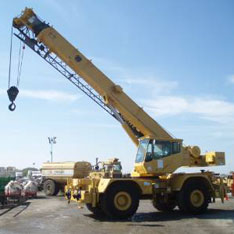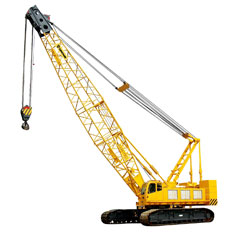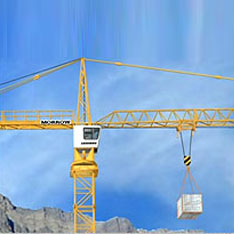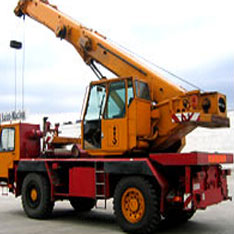Crawler Crane Search Result

Rough terrain crane
and for off-road and "rough terrain" applications. Outriggers are used to level and stabilize the crane for hoisting. These telescopic cranes are single-engine machines, with the same engine powering the undercarriage and the crane, similar to a Crawler Crane. In a rough terrain crane, the engine is usually mounted in the undercarriage rather than in the upper, as with crawler crane. Rough-terrain cranes have high mobility and can work best if combined with the operation of a tower crane. These

Crawler Crane
A Crawler Crane is a crane mounted on an undercarriage with a set of tracks (also called crawlers) that provide stability and mobility. Crawler cranes range in lifting capacity from about 40 to 3,500 short tons (35.7 to 3,125.0 long tons; 36.3 to 3,175.1

Cranes
Development depends on infrastructure and infrastructure on heavy machineries. Of all the heavy machines Cranes acquire an important position as they are involved in the building and maintenance of huge projects. Crane machines are the huge tower like machineries having ropes meant to lift or to lower any heavy devices. Hence they are also referred

Tower Crane
at any major construction site. They are used to lift steel, concrete, large tools like acetylene torches and generators, and a wide variety of other building materials. Tower cranes have distinct advantages over conventional lattice boom Crawlers or truck cranes because the boom or jib looms high above the work site. The tower cranes jib can place its load anywhere within the radius of operation without interfering with the structure over which it swings. In addition, the operator can

Mobile Cranes
mast, base, jib and motor. Stationary cranes are fixed whereas mobile cranes are those cranes which are mounted on trucks, trailers, or other engineering vehicles. Mobile cranes can be classified into four major categories: (1) truck crane; (2) Crawler Crane, (3) rough-terrain crane; and (4) all-terrain crane. These are explained briefly in the following paragraphs.
FAQ About Crawler Crane
- Types of Cranes
- Tower Crane Carrier
- Tower Crane Safety Devices
- YGMT Crane types
- Crane History
- Cranes,overhead traveling crane,Construction cranes,Tower cranes,Mobile cranes,Articulating cranes
- The Manufacturing Process Of Crane
- FACTORS BEHIND THE SELECTION OF CONSTRUCTION EQUIPMENTS
- Mobile Crane Ground Support Capacity
- MOBILE CRANES INTRODUCTION
- Mini crawler cranes
- Crane Gantry
- Crawler Crane QUY50
- Oregon OSHA’s new crane standard for the construction industry
- Bottom-Slewing Tower Cranes Structure and Configuration
used near large bodies of water. They load and unload ships. Cranes are built strong to be used anywhere they are needed. Types of Cranes There are many types of cranes. Four of these are tower cranes, rough terrain cranes, truck cranes, and Crawler Cranes. Rough terrain cranes have large wheels that allow them to move throughout a job site. Truck cranes are mobile cranes. This means their bases can move. A truck is the base for the truck crane. Crawler cranes have tracks instead
Tower crane carrier comprises car-body, Crawler track, and travel gear. Car-body and crawler track is inserted for connection, crawler track extension and retraction is driven by hydraulic cylinder. When transporting, crawler track needs not be removed, and can be transported together
to stow the boom for safety. Boom Angle Limit When boom angle is more than 800, load moment limiter and hoist limit switch stop boom raising. When boom angle is less than 300, hoist limit switch stops boom lowering. Audio/Video Warning When Crawler Crane is moving and slewing, there is light and sound for warning. Tricolor Warning Lamp The lamp comprises 3 colors, when crane loading is below 90% of total rated lifting load, "Green Lamp" lights on to indicate crane is running in safety
Room Crane, Spent Fuel Crane etc. Dry coke Quenching Crane: Processing capacity from 56t/h to 140t/h (corresponding with the coke furnace of 4.3m3 , 6m3 and 7.63m3 ) Multifunctional Crane Bridge Girder Erection Machine CC600-CC2000 Crawler Crane, Tower Crane and Non-standardized Crane etc. Designing and manufacturing Cranes that customer specially required
to be powered by internal combustion engines. During the 1950s, the availability of stronger steels, combined with an increased demand for taller buildings, led to the development of cranes with very long booms attached to small trucks, or to Crawlers with caterpillar treads. Mobile cranes and tower cranes of many different kinds are used extensively in construction sites around the world.
in the work area. Cranes used in construction often perform a variety of tasks and must be controlled by highly skilled operators. Construction cranes are divided into mobile cranes and tower cranes. Mobile cranes are mounted on trucks or Crawlers in order to travel from place to place. An articulating crane is a mobile crane in which there is a joint between two sections of the boom, allowing it to move in a way similar to a knuckle in a human finger. Articulating cranes are generally
the steel components are welded or bolted into place. The exact procedures followed during this process vary depending on the type of crane being assembled. For a mobile crane, the components are then assembled to a standardized truck or Crawler of the appropriate type.The assembled crane is tested and shipped. Depending on the size and type of crane, it may be broken down into subsections to be assembled on site. It may also be shipped whole on special large trucks.
to keep low equipment asset. Site-specific Site conditions-both ground conditions as well as climatic conditions-may affect the equipment-selection decision. For example, the soil and profile of a site may dictate whether to go for a Crawler-mounted equip- ment or a wheel-mounted equipment. If there is a power line at or in the vicinity of site, one may go for a fixed-base kind of equipment rather than a mobile kind of equipment. Similarly, climatic conditions such as
the backfill is fresh; over time, runoff and pounding of traffic may cause some revealing rutting.Backfilling around footings is also frequently loose and uncontrolled, a potential danger for crane support.A perilous condition, especially for Crawler Cranes, is a support that is partly on soft backfill and partly on hard ground leading to differential settlement under the crane. Fresh backfilled areas are prone to this hazard.Pavements conceal manhole chambers and utility vaults that
MOBILE CRANES (a) Truck mounted (b) Crawler mounted (c) Rail mounted locomotive (d) Floating cranes (e) Sky cranes Mobile crane (power driven) includes all type of traveling jib cranes, such as truck mounted, crawler mounted, and locomotive crane on rails.Mobile cranes are
Mini Crawler Cranes are compact and tough, and suitable for all types of terrain. The low overall operating weight, compact dimensions and alternative power sources allow the cranes to access sites other
with a sort of crane, that cranes were used in medieval shipyards and ports in Poland. The various types of cranes in common use are railroad cranes, mobile cranes, telescopic cranes, tower cranes, truck-mounted cranes, rough terrain cranes, Crawler Cranes, loader cranes, floating cranes, gantry cranes and aerial cranes. A crane mounted on a railroad car or on a flatcar is known as railroad crane. Mobile cranes are the most basic and common type of crane, which as the name implies, can
[caption id="attachment_403" align="aligncenter" width="413" caption="Crawler Crane quy50"][/caption] Item Unit Parameter Max. lifting capacity Boom t 50 Jib t 4 Max. load moment kN.m 1815 Boom length m 13?52 Boom
equipment is covered? Oregon OSHA’s crane standard covers power-operated equipment used in construction that can hoist, lower, and horizontally move a suspended load – including, but not limited to: Articulating knuckle-boom cranes Crawler Cranes Derricks Mobile cranes Tower cranes The standard also applies to crane attachments such as: Augers and drills Clamshell buckets Concrete buckets Hooks Personnel platforms What equipment isn’t covered? Equipment
only for infrequent crane relocations on the jobsite, without loads, and not for operation. In truck-mounted tower cranes (see below), the truck replaces the conven- tional undercarriage. Another configuration, seen mainly in Europe, is that of a Crawler under- carriage (Figure 19.16b). Whenever it is not in motion, the crane is stabilized by outriggers. Slewing ring. The slewing ring of the top-slowing crane is located near the top of the crane, but the slewing ring of a bottom-slewing crane
Relative Searches
Crawler Crane, Crane With Trolley, Crane Wheel, Crane Tractor, Crane Tower, Crawler Crane, Diesel Crane, Double Crane, Double Girder Crane, Electric Crane,

Email: sales@bossbuyer.com
Skype: bossbuyer
Market Hotline
0086-21-61435-919
Service Hotline:
0086-21-61435-919
